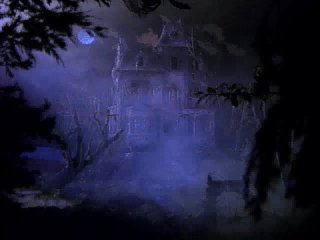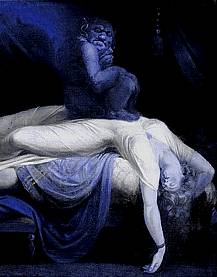
Theme: American Gothic
Course Syllabus
Spring Semester 2012
MWF 1:00-1:50, Grubbs Hall 312
Pittsburg State University
Instructor: Dr. K. Nichols
E-mail: knichols11@cox.net
Course Description
This course will examine how representations of horror and terror in nineteenth- and twentieth-century American literature encode our individual and national anxieties about the dark side of life--our fears of the unknown, the irrational, the supernatural; our fears of victimization, of sexuality, of identity-loss; our fears of dissolving or transgressed boundaries between self and other, sanity and madness, civilization and savagery, good and evil. Beginning with the dark romantic gothic of Brown, Hawthorne, and Poe, we will trace these themes, including "female gothic" and "racial gothic," up to the present. Several classic horror films will also be viewed.
The delivery method for this course is face-to-face.
Required Texts
- Charles Brockden Brown. Wieland, or the Transformation. Prometheus Books, ISBN: 9781573921756.
- Edgar Allan Poe. The Gold-Bug and Other Tales. Dover, ISBN: 9780486268750.
- Nathaniel Hawthorne. Young Goodman Brown and Other Short Stories. Dover, ISBN: 9780486270609.
- Henry James. The Turn of the Screw and Other Short Stories. Dover, ISBN: 9780486266848
- Flannery O'Connor. A Good Man Is Hard to Find and Other Stories. Harvest Books, ISBN: 9780156364652.
- Shirley Jackson. The Haunting of Hill House. Penguin, ISBN: 9780140071085.
- Richard Wright. Native Son [NOTE: Abridged Edition]. HarperTrade Perennial, ISBN: 9780060533489.
- Toni Morrison. Beloved. Random, ISBN: 9781400033416.
Additional shorter texts (online copies of stories and poems) are listed on the Reading Schedule. Bringing printed copies to class will facilitate class discussions.
Grading Policy
- 3 exams (20% each)
- 1 shorter paper, 4-5 pp. (15%). Online directions.
- 1 longer paper, 6-8 pp. (25%). Online directions.
All major assignments must be completed to pass the course.
You may e-mail papers to me at knichols11@cox.net, but make sure they are attached as a .doc file or a .rtf file.
Extra Credit
You can earn a half-letter grade credit (added on to your final grade) by watching four of the following gothic movies and writing a short report on each one: the German expressionist classic silent film The Cabinet of Dr. Caligari (1920), Academy Award-winning Alfred Hitchcock film Rebecca (1940), parts II and III of the sci-fi gothic trilogy Aliens (1986) and Alien 3 (1992), the modern cinematic version of the 19th Century classic Bram Stoker's Dracula (1992) directed by Francis Ford Coppola, and/or the very recent Poe-like film The Raven now showing at your local theater. The other films are available in our departmental video collection (the departmental secretary will check the video out to you) or at your nearest video rental store. Use this online Cultural Event Report Form for each report.
Late Work Policy
Late papers will be graded down one letter grade for each day they are late.
Missed exams must be made up just as soon as possible. See me immediately when you return to class.
Absence Policy:
Regular attendance is required. Everyone has four pre-excused absences for those difficult times in life that interfere with class attendance, so you do not need to clear absences with me, but it is a good idea to check with me (or a classmate) to make sure an assignment was not changed while you were gone.
Students who miss more than four classes may be dropped from the roster for "excessive absences."
Plagiarism Policy:
I strongly support the policies of the English Department and the University on plagiarism. Cheating or passing off anyone else's work (whether your roommate's or a published article) as your own may result in an "F" for that paper or an "F" for the course. See the PSU Academic Honesty and Misconduct policy (online).
Since most students are here to learn, I am happy to help anyone who is wants to learn how to avoid plagiarism. Here are a few basic rules for avoiding plagiarism (online).
Course Web Pages:
You can quickly access our online syllabus by typing in one of the following addresses:
- Engl 566 Course Syllabus: arcadiasystems.org/academia/goth.html (online).
Click on the links at the top or bottom of this page to access the Daily Reading Schedule and other class pages. Click the BACK BUTTON (upper left corner) one or more times to return to your starting page. - Dr. Nichols' Home Page: arcadiasystems.org/academia/nichols.html (online).
You can also access my home page (which links to all my web pages) by going to the "English Department" web page. Click on the "Faculty" list and then on my name--which is linked to my home page.
Instructor's Office Hours:
Office: Grubbs Hall 450
Office Hours: MWF 12:00-12:50; 2:00-2:50; or by appointment
The best ways to contact me are to leave a note taped to my office door or, even better, email me at the following address: knichols11@cox.net.
PSU Syllabus Supplement Spring 2012
This link--Syllabus Supplement Spring 2012 (online)-- will take you to a "one-stop place for students" to access up-to-date information about severe weather policies, financial assistance, important dates, dropping a course, class attendance, computer technology assistance, learning disabilities, PSU's non-discrimination policy, PSU's academic integrity policy, and other related items PSU students need to know. This student resource is approved by the Faculty Senate. Feel free to browse and keep yourself informed.
Return to Dr. Nichols' Home Page

